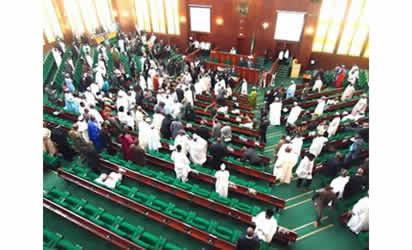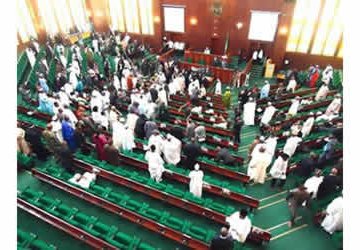
Following this development, the Presidential election would now come last as it was before the immediate Past INEC, Professor Atahiru Jega altered it.
According to the new arrangement, the exercise will begin with the election into the National Assembly to be followed by governorship and House of Assembly elections respectively.
If passed into law, primaries will be held not earlier than 90 days and not later than 60 days to the date of the election to the offices.
The Independent National Electoral Commission (INEC) however retained its power to appoint the dates of the elections.
The new developments followed the consideration and adoption of the report of House Committee on Electoral and Political Matters on a Bill for an Act to further amend the Electoral Act, 2010 by the Committee of the Whole House.
The Committee was chaired by the Deputy Speaker Yussuff Lasun, who averted what could have degenerated into a rowdy session during the adoption of the amendment of Section 25 of the principal Act, whereby Section 25 was substituted with a new Section 25.
There was, however, some murmuring by some members of All Progressives Congress, APC with the adoption of the motion for the amendment of the clause by Kingsley Chinda by the majority members as a member Hom
Yusuf Bala accused Lasun of playing Peoples Democratic Party’s (PDP) script by allowing the amendment to be taken in the first place.
Even, to express his anger on his way out of the Chamber, the member on way his way out of the chamber, shouted: “You are doing a PDP amendment”.
However, the Deputy Speaker appealed to other members to ignored the Honourable member and not to respond, saying everyone is entitled to his or her opinion.
The lawmakers also amended Section 33 on Political parties changing candidates, with the new provision stating that, “Provided that on the event of death of a governorship candidate any time before the conclusion of an election, the party shall choose the person running with him as a deputy governor, or any other candidate in the event of the person running with him withdrawing to replace the deceased governor”.
A new Section 33 (1) was also added to stipulate that “Notwithstanding the provisions of this Act, no political party shall be allowed to change or substitute any candidate for an election once the poll has commenced.
A new Section. 33 (2) also states that “If a candidate whose name was submitted to the Commission dies or withdraws from the election, the political party which nominated the candidate shall forward to the Commission the name of the aspirant who scored the second highest number of votes as the substituted candidate”.
On withdrawal of candidates, the House amended the principal Act by substituting 30 with 90 to read “A candidate may withdraw his candidature by notice in writing signed by him and delivered to the political party that nominated him for the election and the political party shall convey such withdrawal to the Commission and which shall only be allowed not later than 30 days to the election”.
Section 36 on the death of a candidate was also amended with the insertion of a new Section 36 (A) on Second run – off to replace candidate, now to read, “Where a candidate withdraws his candidature or dies before the commencement of polls in accordance with the provisions of Section 35 and 36 of this Act, the political party that nominated the candidate shall conduct new primary to nominate a new candidate within seven days of withdrawal or death”.
A new Section 36 (1)(3) stated that “Where a candidate dies in the circumstances stated under subsection (1) of this Section, the next person, from the same political party where the deceased emerged, with the second highest votes in the primary election shall be submitted to the Commission shall accept such replacement as if the deceased is alive.
Also, two new sub-sections 3 and 4 were added to Section 36.
36 (3) states that “If during the commencement of the poll but before the conclusion of elections for the office of the President or Governor of a state, one of the nominated candidates of a political party dies, the Commission shall allow the running mate, that is, the Party’s Vice Presidential candidate or Deputy Gubernatorial candidate to continue and conclude the poll and should he score the majority of votes cast in accordance with the Constitution, be declared the winner of the said election.
New 36 (4) states that “If during the commencement of the poll but before the conclusion of the elections for any not the Legislative Houses of the Federation, a candidate nominated and sponsored by a political party dies, the political party shall conduct a fresh election to nominate the candidate in accordance with Section 87 of the Electoral Act”.
Section 91 (2) was also amended to increase the maximum election expenses to be uncured by a Presidential candidate from N1b to N5b while Section 91 (3) increases maximum expenses for governorship election to N1b from N200m
Similarly, the figures in Section 91 (4) for Senatorial and House of Representatives seat to the National Assembly were increased to N100m and N70m from N40m and N20m respectively.
Maximum State Assembly elections expenses were also increased to N30m from N10m in Section 91(5).
On the conduct of poll by open secret ballot in Section 52, a new (1) (b) was inserted to Provide for the use of technology in voting.
Also, a new subsection 3 was also added, to read “Uniform technological device shall be used for elections across the country as the Commission may determine”.
WATCH TOP VIDEOS FROM NIGERIAN TRIBUNE TV
- Let’s Talk About SELF-AWARENESS
- Is Your Confidence Mistaken for Pride? Let’s talk about it
- Is Etiquette About Perfection…Or Just Not Being Rude?
- Top Psychologist Reveal 3 Signs You’re Struggling With Imposter Syndrome
- Do You Pick Up Work-Related Calls at Midnight or Never? Let’s Talk About Boundaries







